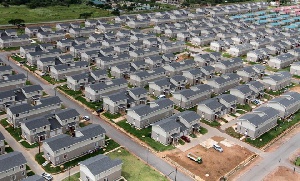In the business world, a deficit in the supply of a product means ready market and a huge opportunity for any entrepreneur or institution that is able to supply the product.
While this is true in most of the cases, it is not entirely the case in Ghana's housing sector, where some 60 per cent of city dwellers are struggling to secure decent homes for themselves. From 1.2 million units, the housing deficit spiraled to 1.7 million units in June 2013, forcing the annual demand for houses to also firm up to 100,000 units.
Although the deficit has attracted a record number of estate developers and ancillary service providers into the real estate business, the number of houses supplied per annum still dwarf demand by 60 per cent - 60,000 units.
The Ministry of Water Resources, Works and Housing and the Center for Sustainable Housing Finance recently estimated that some 40,000 units are delivered annually, with majority of them taking years to complete.
What is even more surprising is the fact that about 90 per cent of the national housing stock are constructed by individual homeowners and small scale contractors, who use between five years to 15 years to complete them.
The few that are delivered by estate developers are also priced above the reach of majority of the home seekers.
Although the introduction of mortgage facilities has helped to ease the burden of financing, the pricy nature of their facilities means that only people with monthly incomes up to US$1,200 can access them.
Sadly, however, only 10 per cent of the 4.6 million households in the country fall under this bracket, according to the Ghana Real Estate Developers Association (GREDA) and the Department of Building Technology at the Kwame Nkrumah University of Science and Technology (KNUST).
Long term finance
This requires that banks, which are at the center of this quagmire, come out with innovative ways to help reduce the cost of housing finance. One of those ways is extending the tenure of their sources of funding.
For decades, finance institutions have used short term funds to finance real estate activities, which leads to the high cost of mortgages or prices of houses in the market.
To revise this, a chartered financial analyst, Mr Abdul-Jaleel Hussein, recommends that banks enter into partnerships with development finance institutions, including the International Finance Corporation (IFC), to gain access to long term capital that can be on-lent to real estate developers at moderate rates.
"Banks would have to look for cheaper sources of financing, which they can lend to developers at comparatively lower rates," said Mr. Hussein, who heads Commercial Banking at Stanbic Bank.
As a long term product, Mr. Hussein said mortgages needed to be funded by corresponding long term finances, which are unfortunately not available in Ghana.
"Because of that banks are left with short term funds from depositors to use in financing long term projects,” he said. "So, banks will now have to look at partnering with development agencies such as the IFC and Africa Development Bank (AfDB) because they are able to assist with that. They offer banks very cheap source of long term funding, which they can on-lent to targeted groups of people."
Mr. Hussein made this assertion ahead of the Standard Bank Trans-Regional Conference slated for the October.
The conference, organised by the parent bank of Stanbic Bank Ghana Limited, is aimed at exploring investment opportunities in the sub-region, including those in the real estate sector, which is bedeviled with ineffective demand in the country.
Other strategies
With most Ghanaians spending a minimum of 43 per cent of their incomes on consumption related expenditure, Mr. Hussein said not much was left for capital investments, including mortgage.
As a result, he said banks needed to enter into credible partnerships with developers and off-taker institutions to ensure that houses delivered are accessible by those in need of them.
He also mentioned the need to revamp the local housing inputs sector to serve as a cheaper alternative to the pricy imports.
Currently, about 70 per cent of inputs, including ceramics, are imported, making it difficult for developers to control the cost of their final products - the houses.
Mr. Hussein said government could partner with the private sector to help remove this bottleneck by encouraging investments in the value chain.
He, therefore, welcomed efforts by some Chinese investors to establish a ceramics factory, explaining that the initiative, if realised, could help to reduce the cost of houses.
He also mentioned tax waivers for developers that will use local products and easing the challenges associated with land acquisition as some of the interventions the government could use to bridge the housing deficit.
"It is important that there are targeted interventions from government to make sure that the cost of development is reduced. If that happens, the prices of houses will reduce,” he said. "It cannot be a blanket thing; it has to be targeted at areas that the housing deficit is pronounced."
Business News of Tuesday, 27 September 2016
Source: Sandra Manu

















